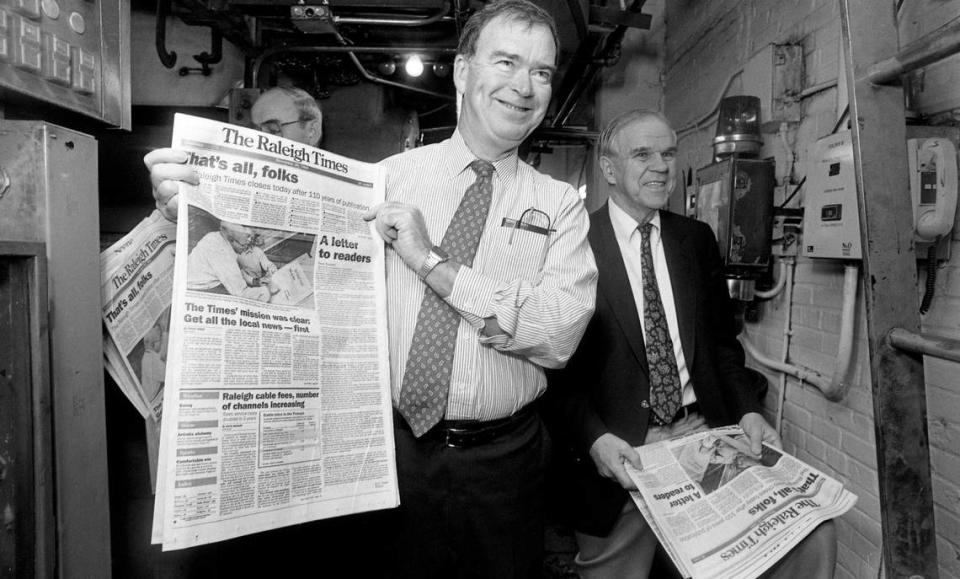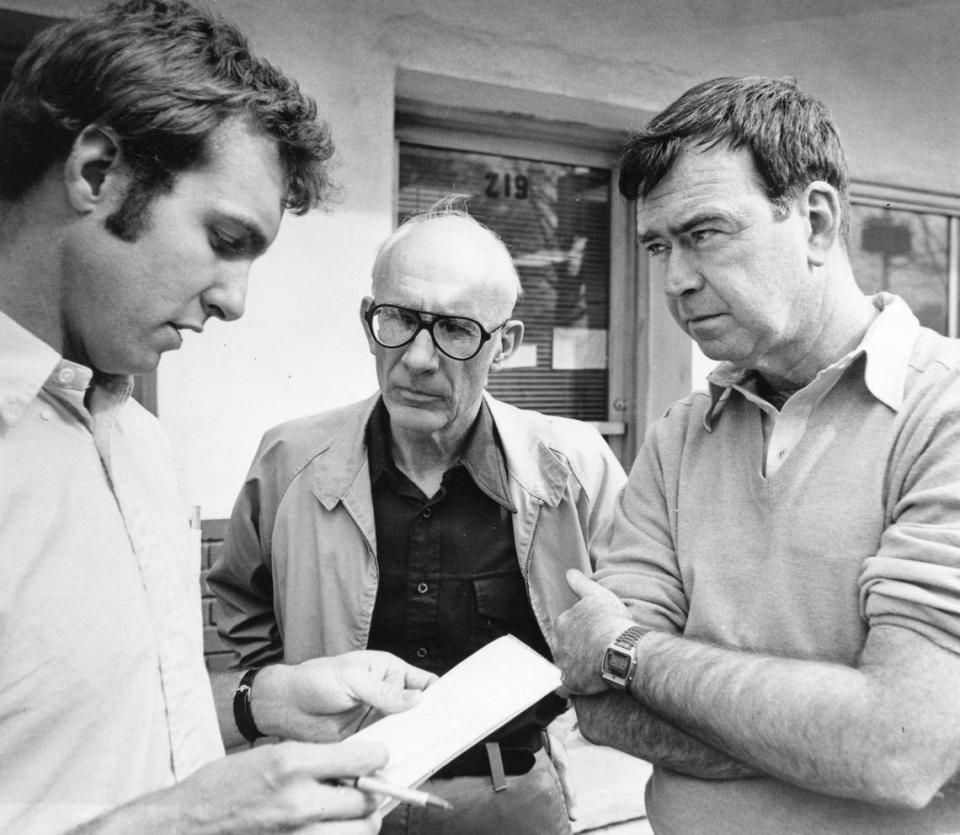Frank Daniels Jr., longtime president and publisher of The News & Observer, dies
Frank Daniels Jr., the blunt, coarse and candidly liberal publisher of The News & Observer, who led his grandfather’s newspaper to a modern age and progressive voice, then stood as the last of his Raleigh family to hold its reins, died Thursday. He was 90.
Daniels served as president and publisher from 1971 to 1996, shortly after his family sold the paper to McClatchy and ended more than a century of local ownership.
But newspaper life consumed him from age 15, when he worked as an N&O office boy and developed what his longtime wife, Julia, described as “ink in his veins.”
During his time, The News & Observer developed into one of the most respected and influential newspapers in the country, attracting Pulitzer Prize-winning writers and editors, branching into computer-assisted reporting and rejecting the white-supremacist agenda pushed by Josephus Daniels — his grandfather who bought the paper at auction in 1894.

‘Always tell the truth’
The N&O under Daniels gained its reputation for liberal opinion pages, along with its nickname “The Nuisance & Disturber.” But as publisher, he brought a commitment to open government so ardent that reporters were required to note in a logbook any time they were denied access to a public records — just in case the paper wanted to sue.
“The most important thing you can do is always tell the truth,” Daniels said in an N&O interview at his retirement. “If the people at the newspaper don’t tell the truth, then people don’t know where you stand. You’ve got to be able to depend on truthfulness.”
As a young man, Daniels stepped away from newspapers briefly, earning a history degree from UNC-Chapel Hill and serving two years in the Air Force, including a stint in Japan.
But when he returned to Chapel Hill for law school, he lasted for only two semesters before the N&O pulled him back and hired him in the advertising department. His father, Frank Daniels Sr., ran the News & Observer at the time, and his uncle Jonathan manned the news desk as its editor.
He moved quickly through the ranks: business manager, treasurer and, in 1968, general manager.

The N&O ‘into the modern era’
It was Daniels’ idea, in 1968, to hire Claude Sitton, who would win the Pulitzer Prize for his commentary in 1983.
As Southern correspondent for The New York Times, Sitton was widely considered the leading reporter in the Civil Rights Movement, filing stories from lunch counter sit-ins, the murder of Freedom Riders in Mississippi and the church bombing in Birmingham, Ala., that killed four girls.
At the time, many white Southerners considered reporters to be unwelcome agitators. Sitton often drew crowds of hostile thugs, to whom he promised, “if they kill me, by God there will be 10 more just like me out of New York the next morning” he once told an N&O interviewer.
Daniels had to have him, outmaneuvering competing newspapers to bring Sitton to Raleigh. By doing so, he changed the N&O’s reputation for good.
“I think it’s fair to say that Claude, along with Frank Daniels Jr., clearly brought The News & Observer into the modern era,” said Ferrell Guillory, a former N&O reporter, editor and UNC professor. “Yes, it was through that era still a newspaper that supported Democrats in campaigns, and pushed hard at what would be considered in today’s terms as a kind of a center-left agenda.
“But there was a clearer distinction than before between the news pages and the editorial pages, and the newspaper developed a business section, got rid of the old women’s section, developed a really good feature section, and it re-opened a Washington bureau.”

A Daniels for a new era
With Daniels in charge, the N&O served as a contrast to the journalism practiced by Josephus Daniels, who used his newspapers to foment a race riot in Wilmington in 1898, killing dozens of Black residents and sending Black leaders into exile. Though the paper did not fully acknowledge its role in that bloody event until 2006, the N&O’s civil rights stance under Daniels moved far away from his ancestor’s bigoted views.
In 2020, the family had Josephus Daniels’ statue removed from Nash Square downtown, and when his namesake middle school changed to Oberlin the same year, Frank Daniels Jr. issued this statement: “Josephus Daniels’ legacy of service to North Carolina and our country does not transcend his reprehensible stand on race and his active support of racist activities.”
Frank Daniels Jr. also made the paper into a decidedly Democratic mouthpiece, at least on its editorial pages, earning the ire of conservatives statewide who loathed but nonetheless read its pages.
Daniels’ paper, including Sitton’s Pulitzer-winning columns, made a frequent target of U.S. Sen Jesse Helms, so much so that when Daniels retired, Helms sent a thank-you note, saying he could never have won so many elections without the help of the “Nuisance & Disturber.”

When the family sold to McClatchy in 1995, those readers lamented losing such a constant foe.
“I am a rabid conservative zealot who begins each morning reading the rabid liberal zealotry of The N&O,” wrote Mel Lewis, reading of the sale at the time. “It will not be the same without a Daniels to cuss over my coffee. I questioned his politics but never questioned his commitment to our community.”
Few who knew him would describe Daniels, by modern standards, as the picture of propriety. His vocabulary was peppered with four-letter words, and his interactions with female journalists would fail contemporary human resource standards.
Legendary Washington Post Publisher Katharine Graham recalled his behavior in an N&O interview around Daniels retirement:
“In the old days — I’d guess you’d call it ‘pre-women,’ — he’d walk into a room, where everybody would be real serious, and he’d say to me, ‘Hiya, Hot Lips!’ “ she said. “I loved it. I thought it was funny. He knew how to tease, how to have fun.”


 Yahoo Movies
Yahoo Movies 